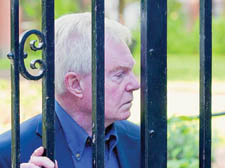|
|
 |
| |

Derek Jacobi goes in search of Charles Dickens’s old haunts |
On trail of Dickens’s cities...
CHARLES DICKENS'S ENGLAND
Directed by Nicholas Wilkinson
Certificate U
THERE can be no doubt of the immense influence Charles Dickens’s work still has on Britain today.
His characters are as famous as any in English literature, and his books are continually adapted for the stage and screen.
But it is not just the sheer number of classics he penned, but his self-appointed role as tub-thumper for the poor and dispossessed that still rings down through the decades. He helped kickstart concepts of the welfare state and opened the eyes of the Victorians to injustices of their newly industrial world.
The opening credits roll with quotes from Dickens’s books, and it immediately becomes obvious how he added to the lexicon in use today: “It was the best of times, it worst of the times”, and “Please sir, can I have some more?” are as well known as the lyrics to Beatles number ones.
This documentary, presented by Derek Jacobi, is a tour of the author’s haunts, taking us from Portsmouth to Kent and then on to the streets of London. Camden, Islington and Westminster feature heavily: we are whisked from Bayham Street to Polygon Road, from the Spaniards Inn and Jack Straw’s Castle to Doughty Street and Seven Dials. Jacobi hopes to enlighten us by eking out winkles of Dickensian architecture and through what remains of the world he knew, show how contemporaneous his work still is.
I have recently become a fan of Jacobi. His is the voice behind the programme that any parent with a child under five loves: In The Night Garden, with its collection of weird creatures speaking utter nonsense.
Much of the documentary has Jacobi ordering dry white wines with other ageing, white-haired and red-faced Dickens fanatics in Victorian gin palaces, chummily discussing what inspired the writer. Then he turns to camera, deadly serious and leather-bound edition in hand, and cannot resist showing that he treads the boards.
But while it is a joy to hear Dickens’s words read out, it occasionally verges on a show reel for Jackanory: Jacobi has the habit of stretching his speech out, so a word with a few syllables becomes a speech marathon, I was exhausted by the time he got to the end of “mem-o-ra-bil-ia”, as he put it.
We are told, briefly, by Roy Hattersley, of Dickens’s time as a parliamentary reporter and the effect this had on the young writer, spurring him to champion social justice. It is a highlight in a film that contains many flaws.
It seems to have been made in a hurry, despite the fact that the world they identify as Dickensian, having survived the 20th century, is not about to suddenly vanish now.
The production values are not great: your attention is constantly distracted by passers-by. Jacobi’s interviews appear to have been done in one take. In one scene he travels to the Medway to visit one of the author’s childhood homes. He goes to the wrong door, and then gets directed to the house he was looking for (a hard mistake to make – it has a plaque on it) by a street corner hoodie and then rings the doorbell.
Dickens’s childhood abode is a family home and the current occupiers seem singularly uninspired by who slept there before them.
While a whistlestop tour around Dickens’s England sounds wonderful, what we are all too often treated to is a one-minute shot of a building that too often bears little resemblance to what was there in Dickens’s day.
Perhaps the best hope is that this film may spur you to go back and read Great Expectations. That will bring Dickens’s England alive in a way sadly this well-meaning but lacklustre film fails to do so. |
 |
|
 |
| |
|
 |
|

